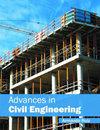长期浇注中断情况下混凝土船闸的温度控制和裂缝预防措施
IF 1.6
4区 工程技术
Q3 CONSTRUCTION & BUILDING TECHNOLOGY
引用次数: 0
摘要
在混凝土船闸的建造过程中,底板和闸壁的浇筑不可避免地会出现长时间的间断。就大体积混凝土而言,长时间的浇筑延迟是新浇筑混凝土出现裂缝的主要原因之一。因此,本研究以大体积混凝土热应力理论为基础,研究了长时间浇注中断后船闸的浇注和结构特征,以确定新浇混凝土裂缝的主要成因。具体而言,提出了一种减少新浇混凝土热应力的分块浇筑方法,并利用有限元法验证了所提方法的温度控制和裂缝预防能力。分析了不同温度控制措施下结构热应力的发展情况,发现通过低温砌块浇筑可有效降低锁壁热应力 50%。结果表明,所提出的方法可以显著降低新浇筑混凝土在长期浇筑中断后的内部热应力,从而突出了其在混凝土船闸中实现有效温度控制和裂缝预防的适用性。本文章由计算机程序翻译,如有差异,请以英文原文为准。
Temperature Control and Crack Prevention Measures for Concrete Ship Locks Subjected to Prolonged Casting Interruptions
During the construction of concrete ship locks, prolonged interruptions between the casting of the floor and lock wall are inevitable. In terms of mass concrete, long placement delays are one of the major reasons for the presence of cracks in newly placed concrete. Therefore, this study examines both the placement and structural characteristics of ship locks after long casting interruptions based on the mass concrete thermal stress theory to determine the major causal factors for cracks in newly poured concrete. Specifically, a block placement method is proposed to reduce thermal stress in newly placed concrete, and the temperature control and crack prevention capacities of the proposed method are verified using the finite element method. The development of the structure’s thermal stress under different temperature control measures is analyzed, finding that thermal stress in the lock walls can be effectively reduced by 50% through low-temperature block casting. The results demonstrate that the proposed method can significantly reduce the internal thermal stress of newly placed concrete after prolonged casting interruptions, thereby highlighting its applicability for achieving effective temperature control and crack prevention in concrete ship locks.
求助全文
通过发布文献求助,成功后即可免费获取论文全文。
去求助
来源期刊

Advances in Civil Engineering
Engineering-Civil and Structural Engineering
CiteScore
4.00
自引率
5.60%
发文量
612
审稿时长
15 weeks
期刊介绍:
Advances in Civil Engineering publishes papers in all areas of civil engineering. The journal welcomes submissions across a range of disciplines, and publishes both theoretical and practical studies. Contributions from academia and from industry are equally encouraged.
Subject areas include (but are by no means limited to):
-Structural mechanics and engineering-
Structural design and construction management-
Structural analysis and computational mechanics-
Construction technology and implementation-
Construction materials design and engineering-
Highway and transport engineering-
Bridge and tunnel engineering-
Municipal and urban engineering-
Coastal, harbour and offshore engineering--
Geotechnical and earthquake engineering
Engineering for water, waste, energy, and environmental applications-
Hydraulic engineering and fluid mechanics-
Surveying, monitoring, and control systems in construction-
Health and safety in a civil engineering setting.
Advances in Civil Engineering also publishes focused review articles that examine the state of the art, identify emerging trends, and suggest future directions for developing fields.
 求助内容:
求助内容: 应助结果提醒方式:
应助结果提醒方式:


